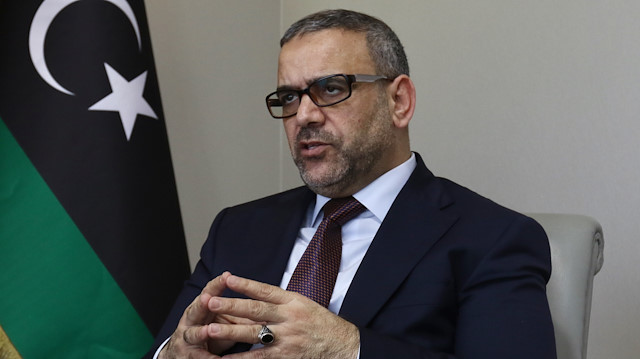

Libyan State Supreme Council President Khalid al-Mishri
Head of Libyan High Council of State says 'Tripoli government can move from defense to attack'
Removing renegade commander Khalifa Haftar is a must for democracy process and holding elections in Libya, a prominent official said.
In an interview with Anadolu Agency, Khalid al-Mishri, chairman of the Libyan High Council of State, stressed the need to end the current interim period and hold elections.
But the democratic process cannot move forward while Haftar forces are present as a rebellion military power that would threat any elected legitimate power in the future.
Al-Mishri said: "We will not allow Haftar by any means to remain in the scene because this would mean he has the ability to turn against the legitimate power," and added that "removing those who have a military project and standing against democracy is a must."
On Jan. 12, the Libya's conflicting parties announced a cease-fire in response to a joint call by the Turkish and Russian leaders. But the talks for a permanent cease-fire ended without an agreement after Haftar left Moscow without signing the deal.
Haftar on Jan. 19 accepted in Berlin to designate members to a UN-proposed military commission with five members from each side to monitor implementation of the ceasefire.
Yet, Haftar's militias continue to attack Tripoli and violate the cease-fire. Last of which was Haftar's Wednesday attacks on Mitiga International Airport in the capital Tripoli.
Haftar’s forces, which received backing from Egypt and the United Arab Emirates, began a major military offensive in April last year to capture Tripoli from the UN-recognized Government of National Accord (GNA), drawing international condemnation.
According to the UN, more than 1,000 people have been killed since the start of the offensive and over 5,000 others injured.
Since the ouster of late ruler Muammar Gaddafi in 2011, two seats of power have emerged in Libya: one in eastern Libya supported mainly by Egypt and the UAE, and the other in Tripoli, which enjoys the UN and international recognition.
- Fragile cease-fire
"We have the ability to repel violations and our abilities are now better and if violations continue we will shift from defense to attack and end the rebellion," al-Mishri said.
Berlin conference resulted in forming a 5 5 joint military commission to set mechanisms to ensure a permanent cease-fire which is expected to convene soon, according to al-Mishri.
He added that the GNA is currently giving a chance for the commission to carry out its role and political dialogue in the time being.
"We have been resilient in an attempt to reach a cease-fire to save lives of Libyans," al-Mishri said, pointing out that the GNA currently takes a defensive position "but this cannot be forever, and the aggression must end."
Regarding the Russian role in ensuring a cease-fire in Libya, al-Mishri stressed that if Russia had the ability to convince him [Haftar] to adhere to a cease-fire deal this could have happened in Moscow, where Haftar refrained from signing the deal, affirming that this "put Russia in a difficult position" after all preparations for the talks.
Referring to the mechanisms on the ground to avoid violations of the cease-fire, al-Mishri asserted that the GNA does not insist on having peacekeeping UN forces, but insists on receiving military support to government forces to defeat the aggression of Haftar.
After talks in Moscow, the GNA had no high expectations from the Berlin conference as there are still no guarantees against violations of agreements, he said.
"When guarantees are missing, the only guarantee we have is defending ourselves and to prepare the required forces for that," added al-Mishri.
"Without true sanctions, there will be no true deal," he stressed.
- No more talks with Haftar
On Libyan Prime Minister Fayez al-Sarraj's rejection of holding talks with Haftar, al-Mishri said: "Haftar committed numerous crimes against humanity and war crimes, and therefore he should not be rewarded by sitting with him [on the negotiation table] or give him any position."
"We do not have hostility with anybody but criminals should be held accountable, not rewarded, this is a basic principle" he stressed.
Reacting to the closure of oil ports and some oil wells in Libya by Haftar, al-Mishri asserted that "all Libyans have right to the Libyan oil and it is the country's primary source of income".
He said he believes that this crisis, which affects many countries, would be resolved within a week or two, asserting that Haftar failed to use the oil card to apply pressure in Berlin conference.
Referring to the relations with Turkey, al-Mishri described it as "strategic partnership".
"The recent deals between Turkey and Libya, he said, facilitated holding the Berlin conference and made Europeans pay attention to the importance of Libya because frankly Libya was neglected for a long time.
"We have a huge production of oil and we need also to build infrastructure," al-Mishri said, adding that Turkey has the ability to help Libya with construction and building infrastructure.
Libya for its part can "encourage petroleum exports and tourism in Turkey," he said.
#cease-fire
#Khalid Al-Mishri
#Khalifa Haftar
#Libya

